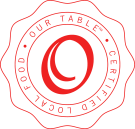As a nation, we seem to have a love affair with violence. We’ve been involved, directly or indirectly, in wars on foreign soil almost continuously for the past 100+ years. Stateside, we seem to find reasons to declare “war” on various social ills (poverty, drugs, homelessness, etc.) every few years; efforts that invariably end up failing while only deepening the root causes of the original problem. As our streets fill with righteous protest, and a pandemic rages unabated across the globe, our politicians and our economy respond in stunningly brutal ways. Elected leaders threaten more violence while the stock market continues its meteoric rise thumbing its nose at the rest of us. The disconnect is astounding and drives me to tears of despair and frustration. The history of American agriculture is also infused with violence. From the original sins of colonization and slavery, to modern slaughterhouses and migrant labor camps, to the indiscriminate use of toxic chemicals that pit humans against the rest of creation. I believe that all of us humans have the capacity for violence – it seems to be in our DNA. However, we also have the capacity to come together for mutual benefit and joy. Our ability to cooperate is also built into our genes. Most importantly, we have the imagination and the power to choose.
Our Table is, at its essence, an attempt to imagine different choices in our food system. All of us who are part of this collective endeavor – from farmers to eaters – are effectively imagining (and helping to create) a world where food is grown and shared without violence. No violence in how we treat the people who grow, make, and sell our food. No violence in how we treat the soil. No violence in our relationship with the plants and animals with whom we share this planet. No violence on our health. No violence in our communities. I am acutely aware that this is a tall order. Nevertheless, I am confident that if we dare to imagine a better world, we can collectively work to build it. What other choice do we have?
The author Arundhati Roy recently wrote: “[the pandemic] offers us a chance to rethink the doomsday machine we have built for ourselves” and is “a portal, a gateway between one world and the next.” As the smoke from the tear gas clears on our streets, it seems to me that the faint outlines of a portal are indeed starting to appear. There is no utopia waiting on the other side. In fact, there is nothing on the other side other than what we imagine and create together. Here’s a thought – what if we choose to stop the violence? What if we start with the simple idea of neighbors breaking bread together and then, arm-in-arm with solidarity, take some tentative steps through this portal together?
- Narendra Varma
Founder, Our Table Cooperative

 RSS Feed
RSS Feed